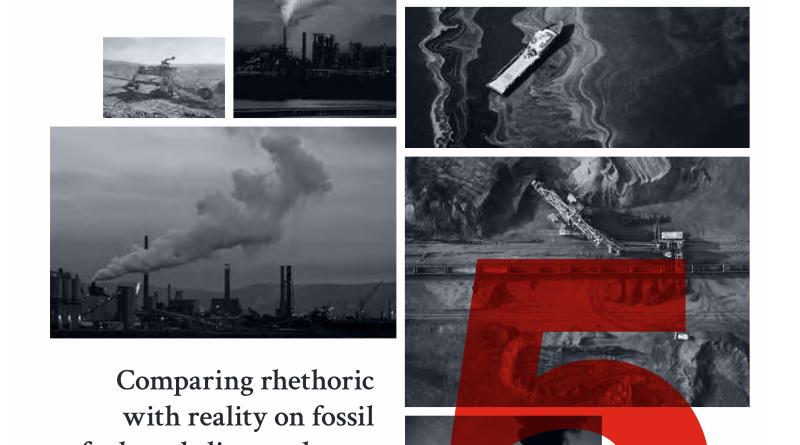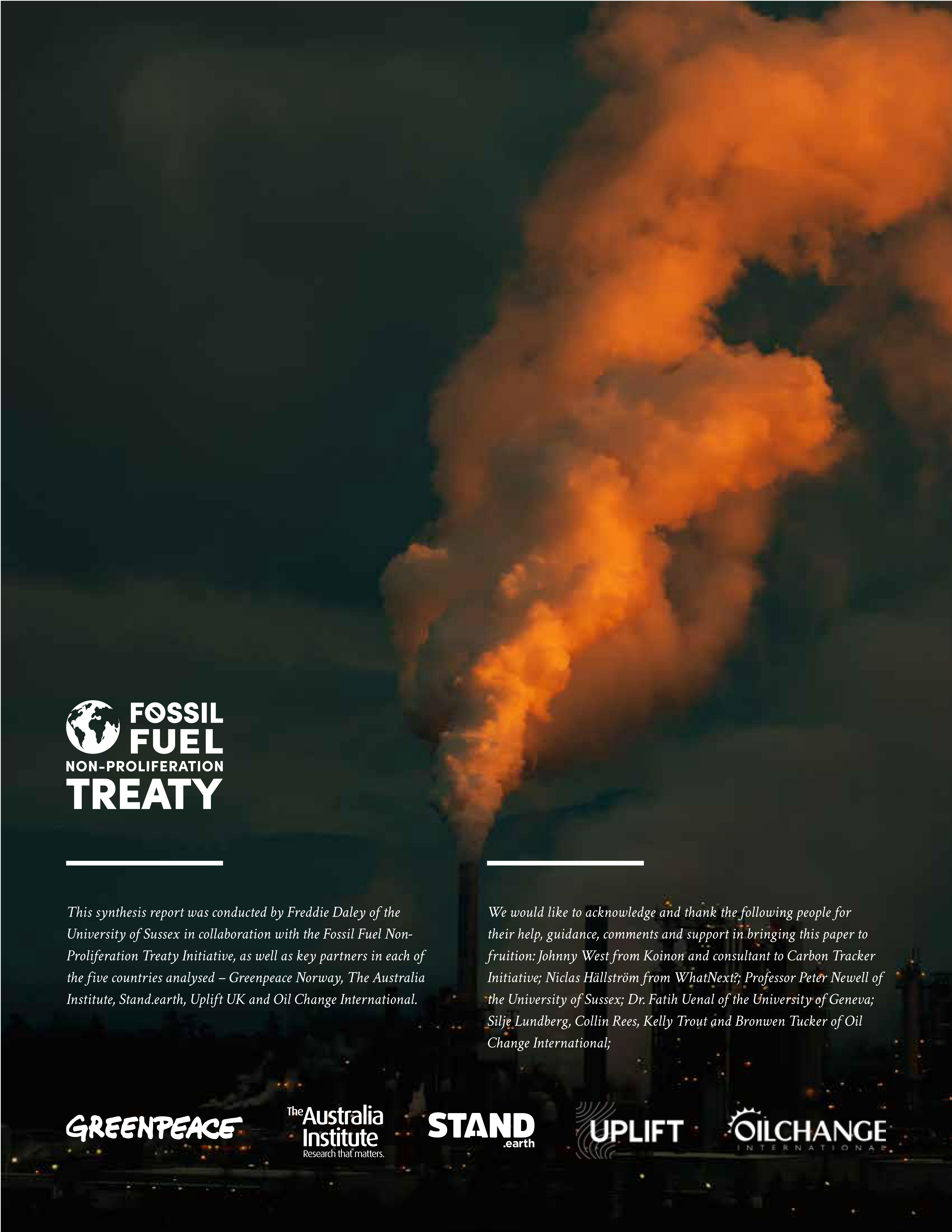THE FOSSIL FUELLED 5

New paper exposes five wealthy countries whose fossil fuel production threatens chances of keeping 1.5ºC hope alive.
The Fossil Fuelled 5 examines five wealthy nations - the US, Canada, Norway, Australia and the UK - that have a widening gap between their rhetoric on climate action and their plans to expand the production of fossil fuels. The paper gives a snapshot of how each is undermining global efforts to address the climate crisis.
12th November - After two weeks of talks, pledges and meetings in Glasgow, a scathing report has cut through the rhetoric of five wealthy nations, including the COP Hosts, by reviewing their plans to expand the production of the primary cause of climate change – fossil fuels.
The report, coined The Fossil Fuelled 5, finds that the gap between climate rhetoric and reality is dangerously wide, with wealthy nations – the UK, US, Canada, Norway and Australia – planning to approve and subsidise new fossil fuel projects which undermines their recent claims of leadership in addressing the climate crisis.
The report that analysed recent government announcements and the latest data on fossil fuel production found that:
-
There is an alarming gap between what the “Fossil Fuelled 5” are pledging to do to reduce their domestic emissions and their plans to expand fossil fuel production, undermining efforts to curtail global emissions and ignoring their responsibility to phase out fossil fuels, rapidly and justly.
-
Coal, oil and gas production must fall globally by 69%, 31% and 28% respectively between now and 2030 to keep the 1.5ºC target alive. However, the projections suggest that the Fossil Fuelled 5 will reduce coal production by only 30%, and actually increase oil and gas production by 33% and 27%, respectively. As wealthy nations, the Fossil Fuelled 5 should be leading this transition away from fossil fuels.
-
Despite their net zero targets and climate pledges these five nations alone have provided over $150 billion in public support for the fossil fuel production and consumption during the COVID-19 pandemic. This level of support to fossil fuel production is more than the entire G7 put towards clean energy as part of the pandemic recovery ($147 billion).
The report released today on the final day of COP26, led by Freddie Daley from the University of Sussex, synthesises the most recent government emissions pledges and compares them to the fossil fuel production plans in the coming decade, as well as other factors such as fossil fuel subsidies. They show that several of the world’s wealthiest nations “are doubling down on fossil fuel production” which will “have disastrous impacts for all life on our planet, but especially those communities in the Global South who have done the least to create this crisis and have the fewest resources to adapt to its impacts.”
Despite their historical responsibility for emissions, and being well-placed to finance a global just transition, these countries are also guilty of exporting large amounts of coal, oil and gas, fuelling other countries’ dependency on dirty energy sources.

Lead author Freddie Daley, Research Associate at the University of Sussex, said:
“There’s an alarming gap between what wealthy nations are saying and what they are doing. You would expect these five nations to provide the leadership needed to move the global economy away from fossil fuels and reduce emissions to zero. However, they seem to be quite content to make pledges and promises with one hand, while expanding and subsidising fossil fuel production to the tune of billions on the other.
“Not only are these wealthy nations jeopardising their own futures and the futures of their citizens through this continued expansion, but they are condemning communities in the global south to a state of perpetual crisis which they did nothing to create. If these nations want to be climate pioneers, it is time they addressed the elephant in the room: fossil fuels.”
Country-specific analysis from the paper’s country profiles include:
United States: The US has pledged to halve emissions by 2030 yet have simultaneously provided $20 billion in annual support to the fossil fuel industry.
United Kingdom: Despite hosting COP26, the UK is expected to green light the Cambo oil field, which contains approximately 255 million barrels of oil.
Canada is looking to increase their price on carbon but also provided approximately $17 billion in public finance to three fossil fuel pipelines between 2018 and 2020.
Norway has raised their ambition to decrease emissions but has already granted 60+ new licenses for fossil fuel production and access to 84 new exploration zones in 2021 alone.
Australia: Despite their recent commitment to net zero by 2050, Australia has over 100 fossil fuel projects currently in the approval pipeline.
The paper was produced by the University of Sussex and conducted in cooperation with the Fossil Fuel Non-Proliferation Treaty Initiative and key regional partners in each of the 5 countries – Uplift (UK), Oil Change International (USA), Greenpeace (Norway), The Australia Institute (Australia) and Stand.earth (Canada).
Tzeporah Berman, Chair of the Fossil Fuel Non-Proliferation Treaty said:
“Canada claims to be a climate leader yet its emissions have continued to rise since signing the Paris Agreement. This is not surprising given the unwillingness of political leaders to address the largest source of emissions - oil and gas. While important steps have been taken such as putting a price on carbon nationally, the Canadian government subsidizes the sector more than any other G20 nation. The Fossil Fuelled 5 report highlights why Canada is standing in the way of binding agreements for a wind down of oil, gas and coal at COP26. It’s not too late to turn things around. When the Minister of Environment and Climate Change returns to Canada, it's imperative that a meaningful cap be placed on emissions from the oil and gas industry and Canada then rejoin the international negotiating table with a real intention to be part of the solution, rather than accelerating the climate emergency.”
Tessa Khan, Founder of Uplift UK said:
“The UK government has invested a lot in trying to persuade people that it is taking action to tackle the climate crisis, but while it is still opening up new oil and gas fields we can discount most of it as hot air. We know that there can’t be any fossil fuel developments if we want a liveable climate and yet the UK government wants to open 30 new oil and gas fields in the North Sea, starting with Cambo. And all the while subsiding fossil fuel companies to the tune of billions. Actions matter now not words. Just stop talking, Prime Minister and instead, stop Cambo.”
Collin Rees, U.S. Program Manager, Oil Change International, said:
"The United States is the poster child for climate hypocrisy — the world's largest historical emitter claiming the mantle of climate leadership while pouring fuel on the fire of the climate crisis. Joe Biden's words will ring hollow until he cancels deadly fossil fuel expansion projects like the Dakota Access Pipeline or the dozens of proposed oil and gas export terminals awaiting approval from his administration. This new report makes it clear the U.S. remains a massive driver of oil and gas expansion, and that won't change until our leaders commit to a managed phase-out of fossil fuel extraction that truly protects communities, workers, and the climate."
Frode Pleym, Executive Director of Greenpeace Norway, said:
"The use of fossil fuels is the number one reason we are currently facing a climate emergency. Yet, the wealthiest countries with the greatest capacity to rapidly transition away from fossil fuels, keep allowing and even subsidising the development of new oil, gas and coal. It’s time for the leaders of countries such as Norway to come together and lead the way out of climate chaos once and for all."
Richie Merizan, Climate & Energy Program Director at Independent Think-Tank, the Australia Institute, said:
“Not only is the Morrison Government unrepentant about Australia’s fossil fuels production and export plans through to 2050 and beyond, it is openly boasting about these plans here at Glasgow. PM Morrison’s Net Zero target does nothing to stop fossil fuel expansion, and goes so far as to explicitly build their continued use into its plan to reduce emissions. While the world moves forward in phasing out fossil fuels – a key aim of this COP, the Morrison Government is intent on driving Australia backwards. Australia is a wealthy country and is in the box seat to be leading the renewable energy transition."
The paper was presented at side event at COP26 – Friday 12th November, 11am UTC, WWF Pavilion, Blue Zone, Glasgow.
About the Fossil Fuel Non-Proliferation Treaty Initiative
The Fossil Fuel Non-Proliferation Treaty Initiative is spurring international cooperation to end new development of fossil fuels, phase out existing production within the agreed climate limit of 1.5°C and develop plans to support workers, communities and countries dependent on fossil fuels to create secure and healthy livelihoods. Cities such as Vancouver and Barcelona have already endorsed the Treaty with more considering motions to endorse. Hundreds of organizations representing thousands more individuals join the call for world leaders to stop fossil fuel expansion.
For more information on the Initiative, please visit the website, explore our Campaign Hub and view the introduction video.



